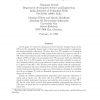Free Online Productivity Tools
i2Speak
i2Symbol
i2OCR
iTex2Img
iWeb2Print
iWeb2Shot
i2Type
iPdf2Split
iPdf2Merge
i2Bopomofo
i2Arabic
i2Style
i2Image
i2PDF
iLatex2Rtf
Sci2ools
FSTTCS
1992
Springer
1992
Springer
On Bounded Truth-Table, Conjunctive, and Randomized Reductions to Sparse Sets
In this paper we study the consequences of the existence of sparse hard sets for NP and other complexity classes under certain types of deterministic, randomized, and nondeterministic reductions. We show that if an NP-complete set is bounded truth-table reducible to some set that conjunctively reduces to a sparse set then P = NP. This result subsumes and extends previously known results ?, ?, ?] yielding a collapse of PH to P under the assumption that NP has sparse hard sets. Relatedly, we show that if an NP-complete set is bounded truth-table reducible to some set that randomly reduces (via a co-rp reduction) to some set that conjunctively reduces to a sparse set then RP = NP. We also prove similar results under the (apparently) weaker assumption that some solution of the promise problem (1SAT SAT) reduces via the mentioned reductions to a sparse set. Our proofs are obtained by combining the left set technique ?] with the Hausdor representation for sets in the boolean closure of set ...
FSTTCS 1992 | Nondeterministic Polynomial Time | Software Engineering | Sparse Hard Sets | Sparse Sets |
| Added | 10 Aug 2010 |
| Updated | 10 Aug 2010 |
| Type | Conference |
| Year | 1992 |
| Where | FSTTCS |
| Authors | Vikraman Arvind, Johannes Köbler, Martin Mundhenk |
Comments (0)

